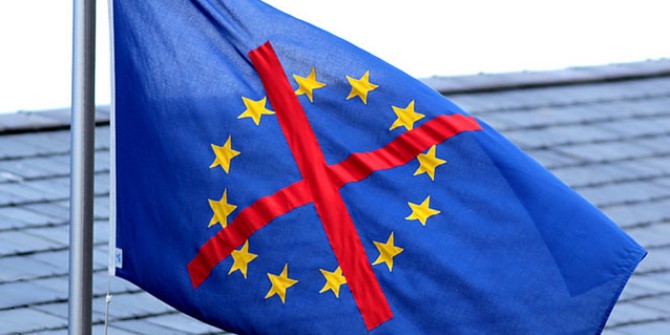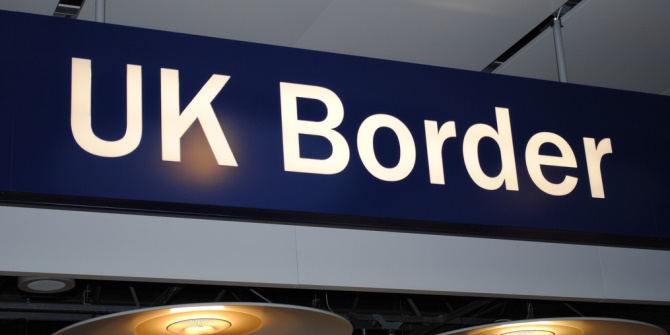 With a referendum on EU membership slated to happen before 2017, a group of academic historians calling themselves ‘Historians for Britain’ have joined together to make the ‘Out’ case. It is an attempt to give an intellectual justification to some anti-EU stances in British politics, writes Andrea Mammone, and is another fashion to spread a right-wing manifesto.
With a referendum on EU membership slated to happen before 2017, a group of academic historians calling themselves ‘Historians for Britain’ have joined together to make the ‘Out’ case. It is an attempt to give an intellectual justification to some anti-EU stances in British politics, writes Andrea Mammone, and is another fashion to spread a right-wing manifesto.
The dream of intellectuals is, frequently, that of providing useful insight for politicians and citizens on how to navigate the difficult waters of the contemporary world. Yet, from time to time, they end up offering partial visions, simply for the use of those in power. An interesting, and worrying, example is represented by the conservative-ukipper Britain. This is the place where Nigel Farage’s anti-EU UKIP gained millions of votes, and where even some candidates for the Labour leadership seem to support an early EU referendum and strict rules undermining a pillar of European integration, the freedom of movement of EU citizens.
After David Cameron’s recent tour of European city capitals to discuss the eventual concessions to keep Westminster in Europe’s community, and highlighting the distinctive features of his national fellows, one would expect an informed and balanced public debate on such significant subject, also because there will be other negotiations before the actual referendum. Some experts are, nonetheless, following the growing anti-foreigner socio-political mood, contributing to people’s confusion on Europe. An allegedly non-partisan cultural enterprise, named ‘Historians for Britain‘, promoting British exceptionalism is particularly coming to the fore. The respected Oxbridge status of some of them might, in fact, provide a public platform for their themes, and they are enjoying some media coverage.
Although lacking authorities of modern Europe, according to their website, they “will ensure that the British people understand that many historians want a better deal from Brussels and are not scared to fight to achieve that change”. “Dozens of …. leading historians have already joined [the] campaign for a return of powers from the EU to the UK,” they triumphantly state, and this “is represented in the media and at events by real historians”. This, unfortunately, overlooks the many other real historians setting up blogs and websites, petitioning, and dismissing this belief in a solitary history enjoyed by the British islands, full of democracy and with little foreign influences (including from fascism and anti-Semitism).
Amusingly, it seems to read some of American novelist Bill Bryson’s pages, especially when, in his Notes from a small island, he wrote how among the common opinions which people believe in the United Kingdom, one is that Great Britain is a somewhat remote island in the middle of the sea, and therefore Europe and the US are equally distant from its lands. Today these historians promote a similar approach, and the distance from the continent should be quickly growing. Yet, there nothing funny here, and forget the word “non-partisan”. These romantic nation-only stances are bizarre, especially when global powers are pushing from other sides of the planet. It is impossible to restore the imperial grandeur of Rome, Paris, London, and Athens.
The Historians for Britain’s claim to provide the British public with an apolitical debate on the historical relationships between Britain and Europe might be, to some extent, even genuine, except that they are linked to the Eurosceptic think tank ‘Business for Britain‘. The latter also published a Historians’ pamphlet, fundamentally a research paper questioning the “historical myth” of an imagined European democracy and a shared belonging. It begins with a passage from a talk given by Cameron in January 2013, and summarizing his position on the subject: “There is not, in my view, a single European demos”.
What it is more, these intellectuals should openly suggest which policies should return to the Queen’s vassals. If it includes, for example, popular themes like immigration and human rights, they should then pay attention in making their request different from European far-right parties such as Marine Le Pen’s Front National, calling for almost immigrant-free nations along with a revision of the European Convention of Human Rights.
These should also consider some real research like the one from UCL economists showing how EU migrants made a positive fiscal contribution (£20bn), including in recession times. They pay taxes more than they receive benefits (and less likely to look for state aid than the natives). This became a human capital educated abroad, with no previous costs for British taxpayers. At other levels there is similarly a positive impact of the EU.
On a different tone, this is essentially showing what we should expect in the coming years. This is a way to make voters thinking that the United Kingdom is better outside the EU, unless the latter grants unrealistic concessions. It is an attempt to give an intellectual justification to some anti-EU stances in British politics, and is another fashion to spread a right-wing manifesto. These historians also promote isolationism and, implicitly, nationalism, in an age when we would not need it. It is not merely politics, it is an overall insular vision of life.
This alleged British exceptionality produces then simply a peculiar, and almost manipulated, history which, de facto, tends to legitimise the authority of some of the existing power, exploiting some popular fears and feelings. In other words, this history will celebrate an ideologically-motivated anti-European reading of the past, offering, indirectly, a narrow belief and protection for the national community. These troubled times would instead need narratives more in line with the most recent interpretations of modern European (and even global) history, and proficient enough to understand our irreversibly cosmopolitan age.
 Andrea Mammone is a historian of modern Europe at Royal Holloway, University of London. His book on transnational neo-fascism is forthcoming in July with Cambridge University Press. He is presently also writing a short book on Europe in recent years. He also has written op-eds for the International Herald Tribune, The Independent, Foreign Affairs, The Guardian, Reuters, The New York Times, and the New Statesman.
Andrea Mammone is a historian of modern Europe at Royal Holloway, University of London. His book on transnational neo-fascism is forthcoming in July with Cambridge University Press. He is presently also writing a short book on Europe in recent years. He also has written op-eds for the International Herald Tribune, The Independent, Foreign Affairs, The Guardian, Reuters, The New York Times, and the New Statesman.







This is horrendously skewed.
“The dream of intellectuals is, frequently, that of providing useful insight for politicians and citizens on how to navigate the difficult waters of the contemporary world. Yet, from time to time, they end up offering partial visions, simply for the use of those in power. An interesting, and worrying, example is represented by the conservative-ukipper Britain.”
How can euro-scepticism be the establishment view when the last four PMs have been evidently pro-europe. Lest, we forget that Thatcher faced a rebellion in part due to her increasingly euro-sceptic comments.
So it appears that your opinion is that anti-Europe historians’ views are partial and unacceptable, while pro-Europe historians’ views are impartial and acceptable. I believe that this view is quite partial.
Let’s focus on the true narrative in modern day UK politics; it is “home rule” and “self determination”. That is the foundation of the Europe issue, of the Scotland issue, and of devolution within England. Therefore, why is “home rule” with the Scotland issue and English devolution “acceptable”, while “home rule” regarding the Europe issue “unacceptable”? Nobody can give a coherent answer to my question. Perhaps the answer is a deep disdain to anything Westminster or London; if that is the case, why give more powers to Brussels, give the powers to the English regions and Scotland (and Wales and N. Ireland).
Interesting. Not sure that the writer’s point is entirely non-political. To be honest neither his credentials seem non-political either. Is this not a left-wing view? Let’s not let academics fuel political divisions on the issue of Europe please. I really don’t think that Andrew Roberts and David Starkey are anti-European historians. But I really know that UCL promotes left leaning political science on the EU and Russia.